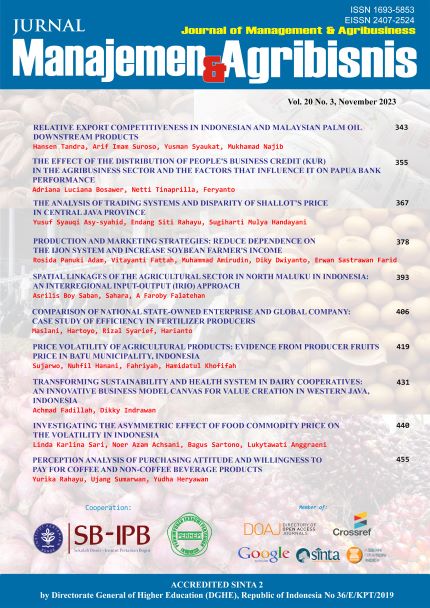The Impact of Irrigation on The Allocative and Economic Efficiencies On Rice Farming: A Case Study in West Nusa Tenggara Province
Abstract
The Integrated Participatory Development and Management Irrigation Program (IPDMIP) is an innovative approach to achieve a sustainable irrigation system. This effort is expected to support the achievement of rice self-sufficiency in accordance with the Indonesian Government's Nawacita program. The purpose of this study was to estimate the technical, allocative and economic efficiencies of rice farming in West Nusa Tenggara Province. Data were collected purposively from 240 samples, with 120 samples that followed the program, and 120 samples non-program. Estimation of allocative and economic efficiency using Stochastic Frontier (SFA) with Cobb-Douglas production function model. The results showed that the factors affecting program rice production were land area, seeds, urea fertilizer, and NPK fertilizer, while non-program were land area, seeds, NPK fertilizer, and organic fertilizer. The average achievement of technical, allocative, and economic efficiency of the rice farming program was 0.906; 0.839, and 0.761 while the non-program was 0.741; 0.794, and 0.892. To achieve the level of allocative and economic efficiency, farmers need to improve the achievement of technical efficiency.
Keywords: economic efficiency, irrigation, production factors, rice paddy
Authors
Authors who publish with this journal agree to the following terms:
- Authors retain copyright and grant the journal right of first publication with the work simultaneously licensed under a Creative Commons Attribution License that allows others to share the work with an acknowledgement of the work's authorship and initial publication in this journal.
- Authors are able to enter into separate, additional contractual arrangements for the non-exclusive distribution of the journal's published version of the work (e.g., post it to an institutional repository or publish it in a book), with an acknowledgement of its initial publication in this journal.
- Authors are permitted and encouraged to post their work online (e.g., in institutional repositories or on their website) prior to and during the submission process, as it can lead to productive exchanges, as well as earlier and greater citation of published work (See The Effect of Open Access).

